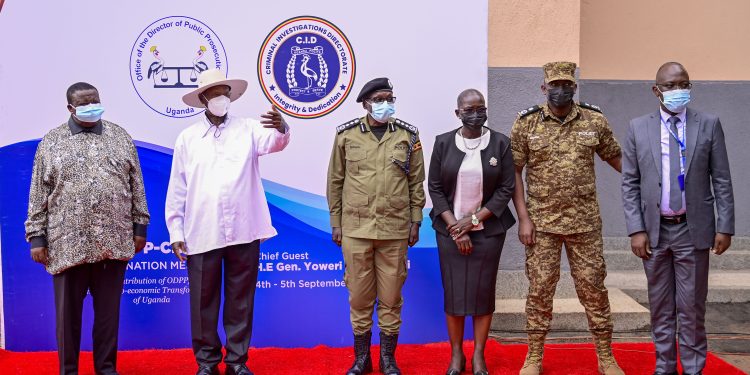President Yoweri Kaguta Museveni has urged Uganda’s criminal investigators to strengthen their collaboration with local communities in the fight against corruption, emphasizing that the task is easier with support from the public, who are the ultimate victims of stolen government resources. Museveni expressed confidence that the local population is willing to share information about corrupt activities, especially as these resources are intended for their benefit.
Speaking on Thursday, September 5, 2024, at the closure of a two-day coordination meeting between the Directorate of Public Prosecutions (DPP) and the Criminal Investigations Directorate (CID) at CID headquarters in Kibuli, the President reiterated the importance of rooting out corruption. He pointed out that government resources like road construction funds, capitation grants for schools, and drugs for health centers are often siphoned off by corrupt individuals.
“Corruption is targeting government resources destined for the people. This is easy work for CID officers. Simply liaise with the victims of corruption, and they will help you identify the culprits,” Museveni urged.
The meeting, held under the theme “The Contribution of ODPP/CID in the Socio-Economic Transformation of Uganda,” brought together over 620 participants, including prosecutors and investigators, to discuss better ways to handle high-profile cases of corruption, land issues, and electoral offenses.
During the event, Museveni also promised to support CID’s establishment of a Crime Data Center and a Forensics Center to bolster investigations, and he highlighted the success of the CCTV camera installations in fighting crime since 2018. He further encouraged the use of technical intelligence solutions in modern investigations.
Touching on the contentious issue of bail in high-profile cases such as murder, treason, and corruption, the President advised investigators not to delay cases and warned against hastily granting bail, which can lead to greater challenges.
“Granting bail is not a right, but a decision by the judge based on circumstances. The accused have rights, but so do the victims. Be cautious, especially with cases that involve significant public interest,” Museveni said.
The President also reassured Ugandans that as the economy grows, public servants would see phased improvements in their welfare. He defended the decision to prioritize scientists and prosecutors for better pay, citing the need to compensate those with scarce skills.
Internal Affairs Minister Maj Gen Kahinda Otafiire used the occasion to call for more collective leadership in the fight against corruption. He pointed out that this fight should not be left solely to the President and reiterated the importance of improving the welfare of police officers.
Inspector General of Police (IGP) Abas Byakagaba also expressed his gratitude for the President’s guidance and support. He reported that crime rates were on a downward trend and assured that more police stations would be established across Uganda’s regions. The IGP also outlined plans to review police training policies and improve living conditions for officers.
Lady Justice Jane Frances Abodo, the Director of Public Prosecutions, praised the strong collaboration between the DPP and CID, noting that their partnership has resulted in a high conviction rate of 86% at the Anti-Corruption Court. She added that the DPP recently established an Investment Crimes Prosecution Unit to handle cases involving investments in Uganda.
CID Director AIGP Tom Magambo shared that their investigative capacity has significantly improved, but he also warned that criminals have increasingly shifted their operations to cyberspace, presenting new challenges for investigators.
The meeting was attended by a host of dignitaries, including Minister of Security Gen. Jim Muhwezi, Attorney General Kiryowa Kiwanuka, IGG Betty Kamya, and other senior officials from the Uganda Police Force and related agencies.
The gathering marks another milestone in Uganda’s ongoing efforts to strengthen its justice system and combat corruption, with a renewed focus on community engagement and technological advancements.





